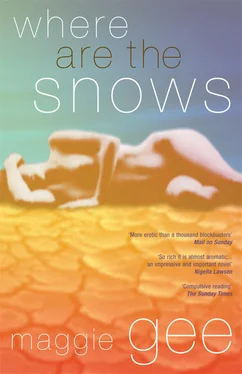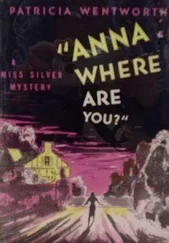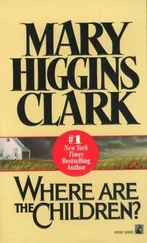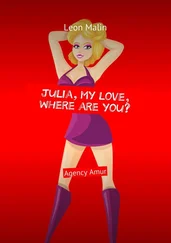— The profession is full of idiots, who should be muzzled, or preferably shot. But my anger was partly in abeyance, then. Most of what they said seemed to be beamed towards me from the other side of a huge sheet of glass; I was recording it all instead of talking back, only the very worst outrages made me talk back. Most of the time I just stared at them, numb, which is not like me, not like me at all. I was not like me. Part of me was dead.
I began to bleed one day in a car which was rattling through the hot Turkish hills. We’d had sex the night before; at first I just thought it was a leak of sperm, Christopher always had a lot of sperm even if it couldn’t make live babies… Christopher felt too depressed to drive, since the latest reports from Isaac were bad, and I didn’t want to bother, so we sat in the back of an old hire-car, suffering the driving of a crazy local. The roof of the car had been rolled back; the heat was intense, even through my straw hat, the road ahead shimmered and slurred in the heat; we threw up a cloud of dust and small stones; every now and then a fly whined by and was sucked into the past with dizzy speed; there was dust and resin in my mouth and lungs and ever since then I have never smelled pines without a cramping sense of dread.
All of a sudden I was afraid. ‘Ask him to pull in to the side of the road,’ I told Christopher. We screeched to a halt and I got out alone. In the trees it was stunningly dark and quiet after the rattling blaze of the open road. Once my eyes adjusted, it was beautiful; a few narrow sunbeams pierced the gloom; perfect yellow flowers underfoot, like buttercups but the leaves were wrong, the gold heads sang in a small pool of sunlight, telling me everything was still all right, but I looked all the same and there was blood, at least it’s dark, that can’t be so dangerous, but as I crouched there a bright splash fell.
— I remember I thought funeral wreath. They were mourning flowers, I knew they were. I walked back to the car like an old woman, trying to walk without moving too much, trying to protect the thing I carried. All at once it seemed infinitely fragile, infinitely open to our hurts. I asked the driver to go back to the hotel and screamed at him when he drove too fast; at every bump I winced and clutched Christopher, suffering the baby’s imagined pain.
The doctor who examined me was reassuring. His English was good; he flattered me, unable to believe I was forty-nine; he said there was often a small amount of bleeding; I could rest if I chose to, but it wasn’t essential. There was no point in tests. We had to wait and see.
I lay in bed for five whole days, I who could never bear to be still. Not far from my window a mournful bell rang out the hours; I lay and counted, lay very still in bed and prayed. When I lay still the bleeding stopped. My spirits rose; I hoped again. For twenty-four hours my towels were clean. Whiteness, cleanness was wonderful. I didn’t read, didn’t want to read, I became a still deep well of longing, a bowl of hope, perfectly blank. I talked to the baby, stroked my belly. ‘I want you. I love you. Hang on, please. I’ll do anything to keep you safe.’ I couldn’t talk to Chris; he was blank and closed; he dumbly brought me whatever I asked for, then went away and drank; I talked to the baby, talked to myself.
After five days I got up again and the sad, slow bleeding started at once, stopping and starting, brown not fresh. I lay down again; it was driving me mad.
‘Let’s fly back to London,’ I said. ‘The best gynaecologist. Stay at the Savoy. That’s quite convenient for Harley Street.’
But things had ceased to follow my plan. I was destined to stay in hospital, flat on my back in the single bed, weeping into the stiff linen pillow, in a room full of florist’s funeral flowers.
Christopher came with me for the ultrasound scan. First of all they listened for the heartbeat; there was a loud, long crackle like snow falling on all the telephone wires in the world, all of them listening for sounds of life; to me it sounded intensely alive, and hope surged hotly through me again. The heart must be tiny, immensely fast. No one said anything, though. Then the little machine slipped across my greased belly. We stared at the screen, heart in mouth. I knew it was no good when the picture steadied and the consultant stared at it, too long, going over and over it, saying nothing. A frozen swirl of meaningless silver. I couldn’t see where the baby was. The pieces hung like a petrified snowstorm. A long silence; I was lying down; my voice had to come from some lost deep place; it broke as I asked, knowing it was hopeless, ‘What can you see? Is it all right?’
They hate to tell bad news. ‘I’m afraid — what should you have been, nine weeks —’
‘— Ten and a half, ten and a half —’
‘I’m afraid it doesn’t look at all hopeful.’
I knew it, but the child in me couldn’t bear it. ‘What do you mean? There was a heartbeat, I heard it —’
‘There was no heartbeat. That wasn’t a heartbeat.’
‘I heard it, I heard it, I heard it beating…’ I was sobbing, now, turning over on my stomach, clutching Chris’s hand because it was there, I hadn’t looked at him but I needed to use him. He was saying something; I couldn’t hear him. The consultant was answering him. They had taken over. I lay and wept; the tears were hot. They had taken it away, my beautiful heartbeat.
‘I’m afraid we’re ninety-nine per cent certain…’
‘You mean there’s some doubt? Could it still be all right?’
There was a silence. ‘I’m afraid… this is a missed abortion. Something we call a missed abortion. I think we should say one hundred per cent and act accordingly.’
I was admitted straightaway for a ‘scrape’. They called it a ‘scrape’ and a ‘missed abortion’… The language was all horrible. All of it denied what had happened to me. As if I was pathetic, deluded, as if I had never really been pregnant, as if I was too old to be pregnant, and everyone else had known all along. The nurses and doctors never called it a baby. It hurt me that they never called it a baby. They called it ‘your pregnancy’, ‘the products of conception’, ‘the foetus’, ‘the foetal sac’.
I asked to see my consultant, but he was overseeing a caesarian, some lucky woman who would have her baby, I would have been happy if they’d cut me in two so long as I could have had my baby… I asked to speak to another doctor, anyone who could explain to me.
He was kind and sensible (cruel and stupid). He tried to be kind, but he was cruel. He tried to be sensible, which made him stupid.
‘It’s a good job it didn’t go any further. It’s nature’s way, you know…’
‘Was the baby deformed? Could you see on the scan?’
‘No, we couldn’t see on the scan… it may have died some time ago.’
Why did he have to tell me that? I wanted to think I had kept it alive for as long as possible.
‘Why did this happen? I’ve been so careful… I’ve rested, I ate healthy food…’
‘Nothing you’d have done could have made any difference. This pregnancy wasn’t right from the start.’
He meant to comfort, but he tortured me. ‘You can’t know that. You can’t know that! I felt absolutely fine, I felt very pregnant, I’d put on weight, my stomach swelled… how can you know it wasn’t right until you do the operation?’
‘I’m ninety-nine per cent sure…’ — The stupidity of that. Why are they always ninety-nine per cent sure? Never ninety-three, never sixty-seven, the cliché-mongers, the morons — ‘… this was something called a blighted ovum. They’re very common. Much more than people realise. As many as one in four… nearly every woman in her childbearing years… no reason why there should be the slightest ill effects… a very minor operation…’ His voice came at me in blaring surges, words I couldn’t, didn’t wish to, take in. He had a stupid red face, and thin mousey hair. Getting no response, he talked too much. His voice was common. I hated him.
Читать дальше












